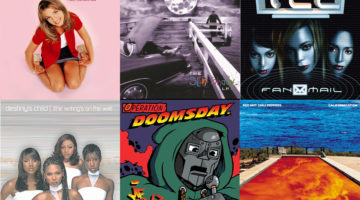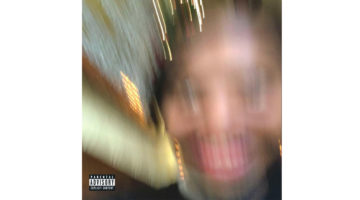 What makes a conscious rapper? The term originally came to define overtly political artists like Public Enemy who sought to destroy racism and the powers that be. These days, the people throw around the term willy-nilly and apply it to nearly any rapper who doesn’t use autotune.
What makes a conscious rapper? The term originally came to define overtly political artists like Public Enemy who sought to destroy racism and the powers that be. These days, the people throw around the term willy-nilly and apply it to nearly any rapper who doesn’t use autotune.
Rapper and producer J. Cole released his new album “K.O.D.” on April 20. Some find J. Cole to be a prolific storyteller and one of the greatest artists of his generation. Others find his insistent wokeness to be a bit contrived. “K.O.D.” doesn’t seem to definitively put him in either of these categories.
J. Cole is in the business of spectacle-building. He panders to a theorizing Twitterverse. Everyone wondered what K.O.D. stands for. J. Cole revealed in a tweet that it stands for not one thing, but several: Kids On Drugs, King Overdosed and Kill Our Demons. J. Cole became infamous for having no features on his past two albums. A mysterious feature popped up on the “K.O.D.” tracklist: kiLL edward. Music blogs went into a frenzy: Who is kiLL edward? The unknown artist just seems to be J. Cole with his voice pitched down. The last song on the album is titled “1985 – Intro to The Fall Off”. What could it possibly mean? What is “The Fall Off?” Is there another album on the way?
Some may find all of this intriguing, but I personally could not care less. Just let the music be what it is. It’s like that kid in your sophomore year poetry workshop who wants to tell everyone what his poem is “actually about.”
The production on “K.O.D.” is pretty stellar. Some songs have jazzy textures with boom bap drums: “The Cut Off”, “BRACKETS”, “FRIENDS”. Others have more minimalistic trap-style beats: “K.O.D.”, “Motiv8”. While the range of sounds is nice, sometimes it prevents the album from flowing cohesively. The greatest merging of these two sounds comes with “ATM”. It’s a nice compromise of the bangers from “2014 Forest Hills” and the denser sound of “4 Your Eyez Only”.
Throughout the album, J. Cole discusses addiction. Addiction to drugs, to cheap chardonnay and Marvin Gaye CDs, to money and to Instagram models. On the title track, he raps “I smoke the drug and it run through my vein/I think it’s workin’ it’s numbin’ the pain.” On “The Cut Off” he raps “Gimme drink, gimme smoke/Get me high, let me float/I’m a cloud, comin’ down/Put me down, gentle now/Gimme drink, gimme dope/Bottom line, I can’t cope.”
J. Cole argues in order to kill our demons, we must stop blaming everything else. On “FRIENDS” he raps “Blame it on Trump shit, blame it on Clinton/Blame it on trap music and the politicians/Or the fact that every black boy wanna be Pippen/But they only got twelve slots on the Pistons.” Although addiction sometimes arises from external forces, we must look inwardly to overcome.
When he tweeted what K.O.D. stands for, he added “The rest of the album I leave to your interpretation.” But he doesn’t. Great writers and rappers present characters and stories with provocative language and let consumers deduce what meaning they may. J. Cole feels the need to overexplain his ideas with obvious rhymes and ham-fisted metaphors. On “FRIENDS”, he blatantly says “I wrote this shit to talk about addiction.” Later, on the same song, he says “I understand this message is not the coolest to say/But if you down to try it I know of a better way: Meditate/Meditate, meditate, meditate, meditate/Don’t medicate, medicate, don’t medicate, medicate.” At the end of the title track, the narrator says “Power, greed/Money, Molly, weed/Percs, Xannys, lean, fame/And the strongest drug of them all/And the strongest drug of them all: Love.”
His songs are good and he has important things to say, but he has to have faith that his fans will understand without him beating the themes to death. It’s like a gratuitous voiceover narration tacked onto a film in post-production.
Sometimes, J. Cole subverts this and it’s thrilling. On a few tracks, he plays a nihilistic, braggadocious character obsessed with money. On “Motiv8” he raps “Please don’t hit my phone up, if you ain’t bout no commas.” On “ATM” he raps “Proceed with caution/I heard if you chase it only results in/A hole in your heart/Fuck it, I take the whole cake and I won’t leave a portion/It’s only an organ.” In a landscape so self-serious people earnestly share Onion articles on Facebook to support their opinions, J. Cole must know that some rap fans will take this at face value.
J. Cole shines when he tells personal stories. On “BRACKETS” he raps about his paranoia about giving his money up to taxes because he sees no positive change in his community as a result. On “Once an Addict – Interlude” he discusses his strained relationship with his mother. In an unrelated note, does anyone know the meaning of an interlude anymore? Artists have “interludes” that are fully fleshed out songs. “Once an Addict” clocks in at over three minutes. Is nothing sacred anymore?
Some of the songs have lame puns in their titles: “Motiv8”, “Kevin’s Heart”, “Window Pain.” Some of the songs grow repetitive. On the title track, he repeats the chorus 12 times. On “ATM”, he uses the phrase “Count It” approximately 75 times.
If the song “1985” (sadly not a “Bowling for Soup” cover) is really the intro to another project, then I’m excited. The beat sounds like something straight off an A Tribe Called Quest album. He criticizes his contemporaries “These white kids love that you don’t give a fuck/’Cause that’s exactly what’s expected when your skin black/They wanna see you dab, they wanna see you pop a pill/They wanna see you tatted from your face to your heels/And somewhere deep down, fuck it, I gotta keep it real/They wanna be black and think your song is how it feels/So when you turn up, you see them turnin’ up too/You hit the next city, collect your money when it’s due.”
Overall, “K.O.D.” is an enjoyable, albeit inconsistent record. J. Cole fans will love it, but it won’t change the mind of many nonbelievers.
Joey Thyne be reached at joeythyne@gmail.com on Twitter @joey_thyne












